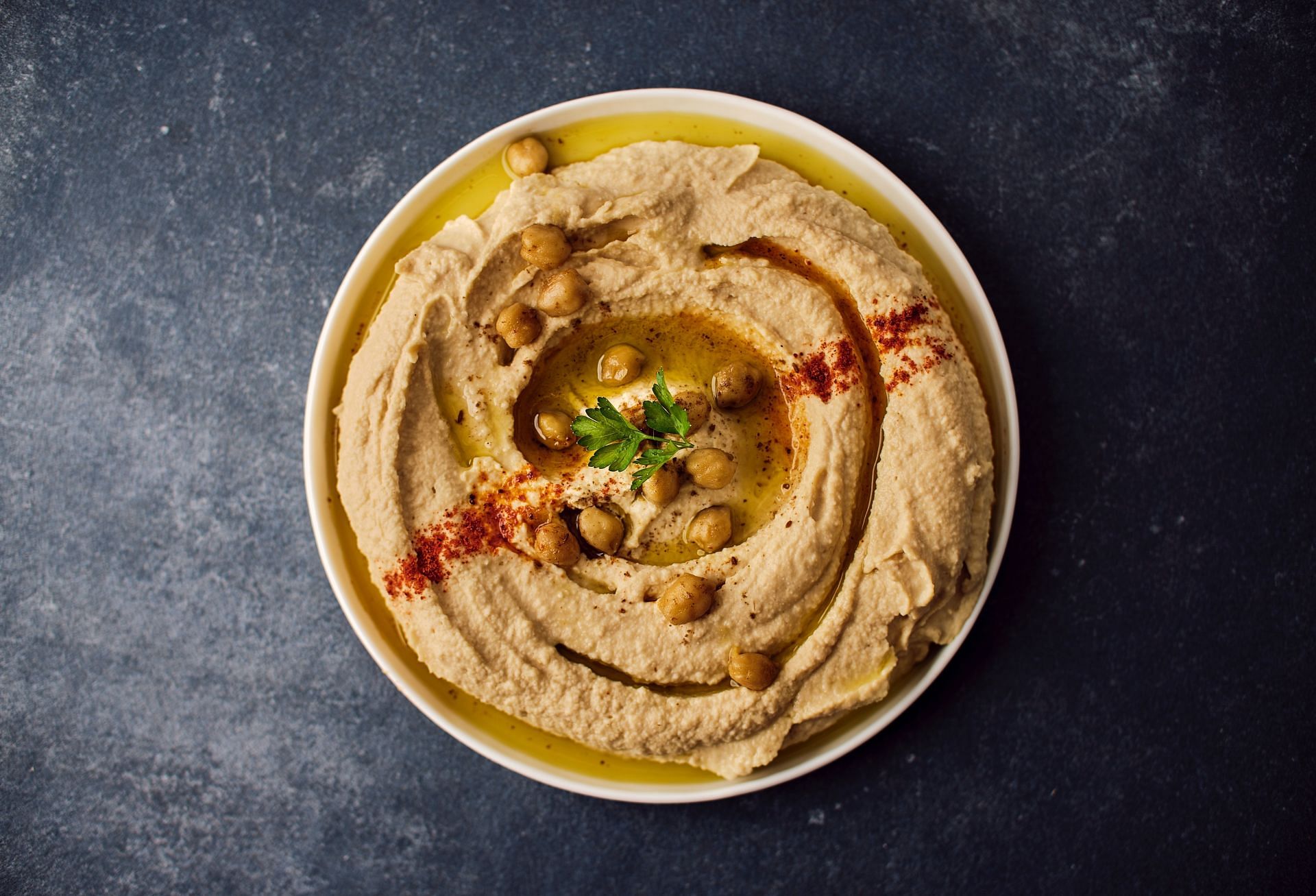Hummus is a popular Middle Eastern dish made from chickpeas and is used as a dip for pita bread.
Hummus is made by blending chickpeas, tahini (ground sesame seeds), olive oil, lemon juice, and garlic. Hummus is a tasty and versatile dish that's loved by many across the world.
In this article, we will discuss the health benefits and calories in hummus, and its recipes.
Nutritional Value of Hummus

Hummus is packed with nutrients, including vitamins and minerals. Hundred grams of this dish provides:
- Calories: 166 kcal
- Fat: 9.6 grams
- Protein: 7.9 grams
- Carbs: 14.3 grams
- Fiber: 6.0 grams
- Manganese: 39% of the RDI
- Copper: 26% of the RDI
- Folate: 21% of the RDI
- Magnesium: 18% of the RDI
- Phosphorus: 18% of the RDI
- Iron: 14% of the RDI
- Zinc: 12% of the RDI
- Thiamin: 12% of the RDI
- Vitamin B6: 10% of the RDI
- Potassium: 7% of the RDI
Chickpeas are a great source of plant-based protein and are ideal for vegans. They provide 7.9 grams of protein, which is quite impressive. The fat content in hummus is also relatively lower than other market spreads. Chickpeas are also among the fiber-rich foods, as they're rich in vitamins and minerals essential for health.
Health Benefits of Hummus
Consumption of chickpeas can provide several health benefits. Some of them are listed below:
1) Might reduce inflammation
Hummus is packed with healthy ingredients that may help reduce chronic inflammation.
Extra virgin olive oil contains the antioxidant oleocanthal, which is known to have anti-inflammatory properties. Sesame seeds present in the dish contain anti-inflammatory compounds, which may reduce the levels of IL6 and C Reactive Protein (CRP).
2) Might improve digestion
Chickpeas in hummus contain a significant amount of essential dietary fiber, which helps soften and add bulk to stool.
Moreover, dietary fiber also promotes the growth of beneficial gut bacteria known as probiotics. These bacteria often produce butyrate, a type of fatty acid that helps nourish the intestinal lining.
3) Might control blood glucose level
Chickpeas have a low glycemic index, and the consumption of hummus does not cause a sharp rise in the levels of blood glucose and insulin. Low glycemic index foods are safe for people suffering from type 2 diabetes mellitus.
Chickpeas are rich in protein, starch, and antinutrients, which slow down the absorption of carbs in the intestine. Fats present in hummus can also regulate the amount of sugar entering the bloodstream. It has been found that chickpeas release much lesser carbs into the blood than foods that have lower carb content.
4) Safe for gluten-intolerant people
Chickpeas are naturally gluten-free and are not related to nuts. Consumption of hummus is considered safe for people with celiac disease, gluten allergy, nut allergy, inflammatory bowel disease, and ulcerative colitis.
It has to be kept in mind that chickpeas are high in raffinose, a type of FODMAP. People on a low FODMAP diet must not consume large amounts of it. Note that this dish also contains sesame seeds, so people allergic to sesame seeds can avoid adding them to their recipe.
Hummus Recipe

There are several ways to prepare this dish using different ingredients and condiments. Here's the recipe:
Ingredients:
- 250 grams of cooked chickpeas
- 1/4 cup (60 ml) fresh lemon juice
- 1/4 cup (60 ml) well-stirred tahini
- 1 small garlic clove, minced
- 2 tablespoons (30 ml) extra-virgin olive oil
- 1/2 teaspoon ground cumin
- Salt to taste
- 30 to 45 ml of water
- Paprika
Instructions:
- In the bowl of a food processor, combine the tahini and lemon juice, and blend for a minute.
- Add the olive oil, minced garlic, cumin, and a 1/2 teaspoon of salt to the whipped tahini and lemon juice, and blend for 30 seconds.
- Add half of the chickpeas to the food processor, and blend for a minute. Add the remaining chickpeas, and blend till the mixture is thick and smooth.
- Serve with a drizzle of olive oil and dash of paprika. You can store it in the refrigerator for up to a week.
Hummus is good for you in many ways. This spread is a nutritious and low-calorie native to the Middle East. It's loaded with protein, vitamins, and minerals. It's vegan and safe for people allergic to gluten. While preparing this dish, ensure to cook the chickpeas well beforehand.

